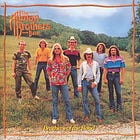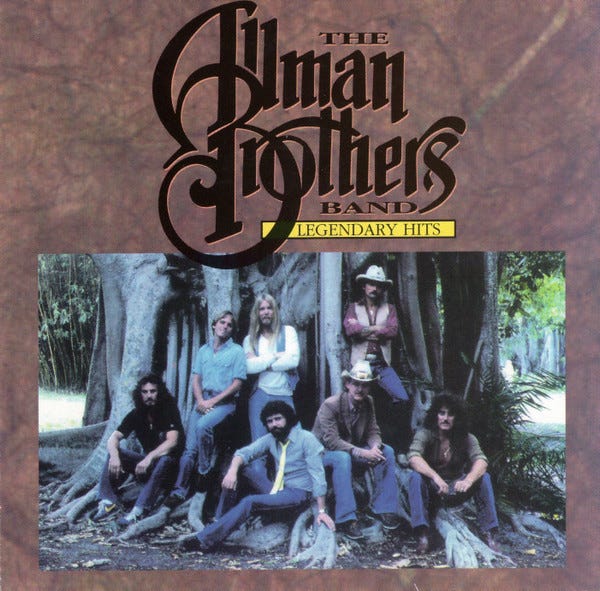Odds & Sods
Welcome to Long Live the ABB; Conversation from the Crossroads of Southern music, history, and culture.
A hearty hello to new subscribers.
Continued thanks to my paid subscribers.
Y’all rule.
Today at Long Live the ABB:
A reader on the ABB’s “lost” album
Gregg’s “Song for Adam” on Southern Blood
B.B. King at Farm Aid 19951
Dickey instrumentals and ABB instrumentals without Dickey (w/Gov’t Mule bonus cut)
PLAYLIST Includes:
13 songs featuring Gregg solo, Dickey solo, Gov’t Mule, Hour Glass, B.B., and the ABB (natch2).
ABB’s 1982 recordings & clearing up a Photo Mystery
Craig Eason sent me “Unreleased: The Allman Brothers Band’s Unreleased 1982 Album” (Kudzoo July 2020) his article in response to my post, “Revisiting the ABB’s Worst Album.”3
Craig piece adds a lot of context to the band’s January 1982 break-up.4 He not only documents every one of the tracks the group recorded, he also sheds light on this band photograph from May 1982 with a lineup that featured Chuck Leavell but no Jaimoe.5
Quoting Craig,
“Chuck did not play in [their] final TV performance. So what is the real story? In October 1982 there is an article in a trade paper called Record featuring an interview with ABB Manager Bert Holman about the next Allman Brothers album being in limbo due to their record company Arista withdrawing support.6
Several tracks are mentioned in the piece—“Lead Me On” “Let Me Ride” “Anything Goes” “Feel Your Love” (a Chuck Leavell composition) and “Lorraine”—credited to Johnny Cobb.
So what became of these tracks? Were they recorded? Do they still exist? Are they any good? The answers to those questions are yes; some, maybe all; and that depends.
Interesting stuff about a relatively unknown and under-explored time in Allman Brothers Band history.
Craig Eason, “Unreleased: The Allman Brothers Band’s Unreleased 1982 Album”
“Song for Adam”
I’ve written about Gregg’s final album Southern Blood before. “Song for Adam,” the album’s closer, is by his old friend Jackson Browne.
The cut always reminded Gregg of Duane so much so that his best friend Chank Middleton thought it was Gregg’s own.
“When me and Gregg started living together in ‘74, I didn't know that much about Jackson Browne. He was he was always singing this ‘Song for Adam,’ but to me it sounded like a song he had written about him and Duane.
Then about the sixth time I heard it, I asked, ‘Did you write this song?’
and he said, ‘No, this is a Jackson Browne song. He wrote it about a friend that died.’
When we were putting songs together for Southern Blood, we were in LA. [Producer] Don Was, me, and Greggory. We met at breakfast that morning to go over the songs….
Right before we got ready to wrap things up Don asked, ‘Chank, what would you liked him to record?’
I told him ‘Song for Adam.’”
Gregg had recorded it as early as 1974. It appeared on One More Try: An Anthology in 1997.
But it’s this version I always turn to. Listen closely for the catch in Gregg’s voice in the final verse. He’s singing that for Duane, at FAME Studios in Muscle Shoals, where it all began for both of them.7
The King of the Blues
B.B. King is a regular around here8 and “How Blue Can You Get?” is a track with resonance to the ABB. Gregg & Duane recorded it with Hour Glass in 1968 at Muscle Shoals. Tedeschi Trucks Band regularly plays it live.9
This performance from Farm Aid 1995 is particularly inspired. Not only B.B.—who is WAILING here—but also his band. (Watch trumpet player James “Boogaloo” Bolden.) And don’t miss King changing out his broken string while singing.
Well worth 5:54 of your time.10
Comments on “The Instrumentals of Dickey Betts part 1”
On Facebook, Robert Wayne Cook posted this in response to my post “The Instrumentals of Dickey Betts part 1”
This is a playlist I put together of instrumentals by all of the ABB and ancillary bands put into chronological order. All of Dickey’s are on here but a lot of others as well. My only rule was there can be zero lyrics of any kind and they are mostly studio.
The only live ones I did are either ones that do not have a studio version like Hot‘lanta or live versions featuring players that I wanted to include that are not on any studio instrumentals like Jack Pearson and Jimmy Herring.
I thought y’all might dig the effort, and find some new ABB-related jams.
Here’s some I sent him in return:
JJ’s Alley/One Stop Bebop
The Allman Brothers Band debuted this Dickey composition at the March 1999 Beacon run—Jack Pearson’s last shows as a member of the band. Dickey named it “JJ’s Alley” because it had a bebop feel, right up Jaimoe’s alley.
Here’s Jack’s solo from 3/19/99. 11
Allman Brothers Band JJ’s Alley 5/7/00
Dickey’s final Allman Brothers Band show.
One Stop Be-Bop
Dickey got right to work after the divorce12 from his bandmates. He recorded and toured first as the Dickey Betts Band, then, after Dangerous Dan Toler signed on as Dickey Betts & Great Southern.
He renamed “JJ’s Alley” “One Stop Be-bop” and recorded it twice.
“One Stop Be-Bop” Electric
Let’s All Get Together (2000)
“One Stop Be-Bop”Acoustic
The way underrated The Collectors #1, the kind of record I wish Dickey had made at least one more of.
Beyond the Pale
Another gem from what turned out to be Dickey’s final album. This one drew inspiration from Irish history, hence the Celtic feel.
ABB Instrumentals without Dickey
There were three. Robert had “Instrumental Illness” on his list. I shared the other two with him:
Egypt 12/3/11 Boston, MA
Bag End 3/13/10 United Palace Theatre
Govt Mule(+) “Afro Blue”
This is “Mountain Jam”-esque in its improvisational brilliance. A bunch of folks who rarely play together anchored by the finest power trio of their era, the mighty Gov’t Mule: Allen Woody, Warren Haynes, Matt Abts along with Chuck Leavell; Derek Trucks; Bernie Worrell; Yonrico Scott; Randall Bramblett; Jimmy Herring.
Buckle up!
Seriously y’all, check this out. B.B. was INSPIRED.
Shout-out Jim K., from whom I learned the term.
More a petering out, things weren’t trending well, no matter the music they were recording.
First as Hour Glass in spring 1968, then Duane’s session work, which led to the Birth of the Allman Brothers Band.
Read more: Live at Cook County Jail and What I’m Reading/Watching
Here’s a random version from recently for y’all. You’re welcome.
Couldn’t find a full version from 1999. Share if you’ve got one & I’ll pass along.
This is really the best way to describe what happened: a bitter divorce. The band suspended him, Dickey fought it, and in the process lost his position in the band. Alan Paul told me, “The band said they wouldn't play with him until he got clean but they were still going to play booked shows.” In response, Dickey filed a grievance and the arbitrator awarded him a financial settlement and payment for the rest of the band's career for every performance. He was unable to prevent them from playing without him.








That Afro Blue cut is killer,what a jam